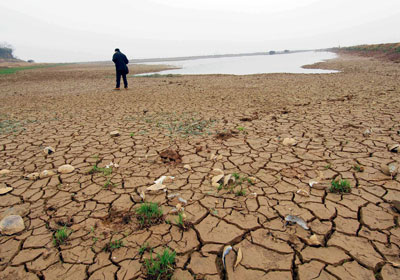- China's largest freshwater lake, Poyang Lake in Jiangxi Province, appears to be drying up.
- The lake, which is fed by the Yangtze River, has an enormous seasonal variability in its surface area, with a minimum occurring every winter.
- This winter's minimum is about 10% of last winter's minimum.

Okay, this is pretty straightforward and statistical, but (apart from the devastating human impact) not that interesting. So what title did Forbes columnist Chris O'Brien choose to draw the reader's interest? Global Warming Hits China.
Is there anything in the essay that might support this notion? We learn that the cause of Poyang's predicament is threefold:
- The Yangtze River basin is suffering a crippling drought. Worst ever? No, its worst in the last 50 years. In other words, this is a drought which, while severe, is neither unprecedented nor rare.
- Upriver hydroelectric projects (including the infamous Three Gorges Dam) have significantly affected the Yangtze's flow downriver.
- The government has embarked on a monumental effort to divert some of the Yangtze's water to the Yellow River.
Both the stream flows into the river and the Yangtze River water to replenish the lake will be insufficient in dry seasons in the future, because of climate change and the exploitation of water resources.As I remarked above, there doesn't seem to be any particular scientific reason to tie China's drought to "climate change" (a term of art that is increasingly used in place of "global warming", although Mr. O'Brien apparently hasn't yet received the memo), but there are plenty of political reasons to do so.
Given his position, Jiang Tong can be forgiven for minimizing the significance of the government's "exploitation of water resources", but Forbes has no such excuse.



 Headlines via e-mail
Headlines via e-mail


